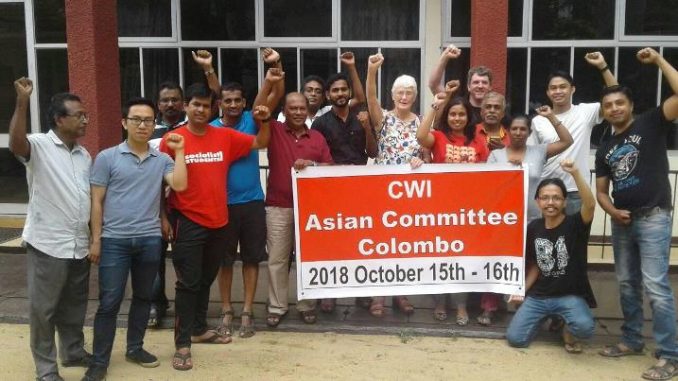
Socialists affiliated with the Committee for a Workers’ International (CWI) met in Sri Lanka in mid-October to discuss politics and class struggle in the Asia Pacific region.
The meeting was held over two days following the inspiring biennial congress of the United Socialist Party (USP). CWI members from India, Malaysia, Australia, Indonesia and Sri Lanka attended, along with a visitor from Kashmir and a member of the Tamil Solidarity Campaign in London.
The Asia-Pacific region is home to more than half of the world’s population, and because of the giant of China, it is an increasingly important region from a geopolitical point of view. The main dynamic in world capitalist relations now is the unfolding conflict between the once dominant United States and the rising power of China.
China is challenging the United States for economic and political influence and the Asia Pacific is a major battleground of this clash.
In recent months, the conflict has escalated and a trade war between these major powers has begun. The United States has imposed tariffs on around half of all imports from China, while China has retaliated with tariffs of its own.
The deteriorating relations between the United States and China impact on every country in the region. Understanding these developments is crucial for all those wanting to effect social change.
Capitalist strategists worry that the trade war could tip the already fragile world economy into another recession. While they are concerned about their profits, a new recession would also have big impacts on workers and the poor. Bosses would slash jobs while many governments would seek to rein in social spending.
Following an introduction by Clare Doyle of the CWI’s Secretariat, the meeting discussed prospects for a repeat of the events surrounding the 1997 Asian financial crisis.
At that time, mass movements broke out in many countries as people pushed back against attempts to make them pay for a crisis they did not create. A number of governments were overthrown in the process.
A new financial crisis, on the back of 1997 and 2008, could have an even bigger impact. For the most part, people feel that they have not recovered from the 2008 global crisis, and governments and institutions have even less authority than before.
There is no doubt that things are very volatile and that mass struggle and revolutions are once again inherent in the situation.
This was the backdrop to the discussions held on the first day of the meeting.
The session was filled with reports about the situation in the various countries we work in, as well as from areas where we are trying to expand the forces of the CWI.
Building our forces was the first topic of discussion on the second day of the meeting – introduced by myself and summed up by Ravi Chandren from Malaysia. There is no doubt that the more capitalism disappoints, the more popular socialist ideas will become in the years ahead.
There will be increasing opportunities for us to grow, but in order to be able to take advantage of those opportunities we need to ensure that we have the fundamentals in place. Developing our perspectives and expanding the membership of our sections will be key tasks for us in the next period.
The final discussion of the meeting looked at the national question in the region, with an introduction by Siritunga Jayasuriya, the general secretary of the USP.
The oppression of nations and national minorities is crucially important to socialists. The conflicts between nations have arisen from the combined and uneven development of capitalism itself. This is especially true in Asia.
Socialist change requires the unity of working class people across national divides. Therefore, a delicate and careful approach to questions and conflicts around nationality is required.
During this session we heard reports about the different ways the national question presents itself across the region. While our demands differ according to the situation, our principled class approach in defence of oppressed nationalities remains the same.
Clare Doyle summed up this discussion and outlined some of the plans for future CWI Asia-Pacific meetings. It was agreed that this albeit brief meeting was very useful in helping to clarify our perspectives and to bring together the practical experiences of some of the CWI groups in the region.
Unfortunately, CWI members from China, Hong Kong, Taiwan and Pakistan were unable to attend on this occasion. However, it is hoped they will be attending future meetings.
There was great enthusiasm to make this kind of meeting a regular event and one which will undoubtedly gain from the input of comrades from other countries in the region. Future meetings will contribute yet more to building the forces for socialist change in the Asia Pacific and across the world.

Be the first to comment